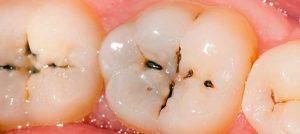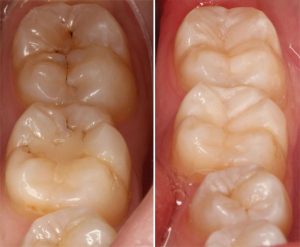Cavities is another word for tooth decay and is highly affected by what we consume and what we brush our teeth with. Read on to find out more information about cavities.
What are Cavities?
 There are several different types of cavities and children are more at risk, but this doesn’t mean adults aren’t affected too. Root cavities involve decaying of the tooth’s root due to receded gums. As this is exposed, it can easily decay. Coronal cavities are the most common cavity in both children and adults and these cavities are usually on the surfaces of the tooth where we chew or in-between teeth. Recurrent decay is decay that forms around existing fillings or crowns.
There are several different types of cavities and children are more at risk, but this doesn’t mean adults aren’t affected too. Root cavities involve decaying of the tooth’s root due to receded gums. As this is exposed, it can easily decay. Coronal cavities are the most common cavity in both children and adults and these cavities are usually on the surfaces of the tooth where we chew or in-between teeth. Recurrent decay is decay that forms around existing fillings or crowns.
Causes of Cavities
 A cavity occurs when certain types of bacteria form and produce acid, which destroys the enamel and the dentin underneath protecting the sensitive areas of the tooth, leaving them exposed to pain and bacteria. Left untreated, a dental cavity can be very serious. It can destroy your tooth and the nerves surrounding it which can lead to further problems such as a dental abscess.
A cavity occurs when certain types of bacteria form and produce acid, which destroys the enamel and the dentin underneath protecting the sensitive areas of the tooth, leaving them exposed to pain and bacteria. Left untreated, a dental cavity can be very serious. It can destroy your tooth and the nerves surrounding it which can lead to further problems such as a dental abscess.
Signs and Symptoms of a Cavity
Only a dentist will be able to tell for sure if you have a cavity but there are some signs and symptoms to look out for. You may have toothache in the affected area, you can have sensitivity to hot or cold food and drinks that you do not normally have, and you may experience pain when chewing on the affected area. The sooner you listen to your symptoms, however mild, the better your chance of reversing the cavity or fixing it before it becomes too late.
Treatment for Cavities

There are a few ways to prevent a cavity before it occurs such as brushing twice and flossing daily, avoiding too many starchy or sugary foods and visiting the dentist for regular check-ups and cleaning. If the cavity has just started, fluoride treatments can treat a cavity, restoring your tooth’s enamel and preventing the cavity from worsening and in some cases, can even reverse the affects. You may need a filling or crown to protect the affected area, and in more serious cavities, a root canal treatment or tooth extraction may be carried out.
To prevent suffering from a cavity, regularly visit a dentist. If you are in need of a dental appointment, contact us to schedule an appointment with the best dentist in New York City.

[…] in the form of severe disease. Here’s an example of understanding the stages during which a cavity becomes a root […]